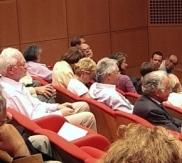#Vorschau
08.03.2017
Die kritische Auseinandersetzung mit der Militärdiktatur ist ein wichtiger Aspekt für das Verständnis der Politik und der Ideengeschichte Griechenlands. Zum Gedenkjahr 2017 plant die Edition Romiosini zwei einschlägige Publikationen: Griechenland seit dem Fall der Militärdiktatur (1974–2009) von Prof. Jannis Voulgaris sowie die revidierte Neuauflage der Anthologie Die Exekution des Mythos... fand am frühen Morgen statt. Beide Ausgaben werden im Frühjahr erscheinen.
Außerdem finden Sie hier eine Übersicht der kommenden Veranstaltungen, an denen das Centrum Modernes Griechenland beteiligt ist:
:: „Και σε μας θα 'ρθεί το Osterhase!“ Zweisprachige Entwicklung und Erziehung in den ersten Lebensjahren — Vortrag von Dr. Anja Leist-Villis mit anschließender Diskussionsrunde, 27. März 2017
:: From Below and In Between – Narrating and Practicing the Cold War in South East Europe — Workshop, 1.–2. Juni 2017
:: Sommerfest der Edition Romiosini (11. Juni 2017, Literarisches Colloquium Berlin)
„Και σε μας θα 'ρθεί το Osterhase!“ Zweisprachige Entwicklung und Erziehung in den ersten Lebensjahren
Die Athene-Grundschule in Lichterfelde-West und das Centrum Modernes Griechenland (CeMoG) laden am Montag, dem 27. März 2017, 19:00 Uhr ein zu einem Vortrag von Dr. Anja Leist-Villis mit anschließender Diskussionsrunde. Die Veranstaltung richtet sich an Eltern, die ihre Kinder zweisprachig erziehen, sowie an PädagogInnen, die Eltern in der zweisprachigen Erziehung unterstützen möchten und an alle, die sich für bilinguale Sprachentwicklung interessieren.
Warum vermischt mein Kind Sprachen? Warum antwortet es mir auf Griechisch, obwohl ich Deutsch mit ihm spreche? Überfordere ich mein Kind vielleicht mit zwei Sprachen? Ist es unhöflich, in der Öffentlichkeit eine Sprache zu sprechen, die andere nicht verstehen? Diese sind einige der wichtigsten Fragen, mit denen sich dieser Vortrag befasst. Außerdem werden praktische Tipps zur zweisprachigen Erziehung vermittelt. Anschließend wird es in einer moderierten Diskussion Gelegenheit zu Nachfragen, Diskussion und Erfahrungsaustausch geben.
Zeit: Montag, 27. März 2017, 19 Uhr
Ort: Athene-Grundschule, Curtiusstraße 37, 12205 Berlin
From Below and In Between – Narrating and Practicing the Cold War in South East Europe
The Cold War as a global geopolitical order after World War II had a profound impact on the comparatively small area of South East Europe. Ideological fault lines divided various countries from one another and resulted in an exceptionally fragmented political landscape: Rumania und Bulgaria joined the Warsaw Pact under Soviet influence, Greece and Turkey became members of the NATO, and Yugoslavia held a leading position in the Non-Aligned movement. Furthermore, Albania broke bonds with the Soviet Union in 1962 and became increasingly isolated. Not only in a Cold War-context, South East Europe is often seen as a periphery to the global centers. The workshop From Below and In Between – Narrating and Practicing the Cold War in South East Europe will challenge this perspective. Instead, we will approach the region as a center of ideological fractions during the Cold War, therefore treating it as a “burning glass” of geopolitical orders.
The workshop not only intends to make a contribution to the regional history during this period but, at the same time, to further general insights on the Cold War. We especially welcome local and actor-centered contributions as well as comparative approaches, which contrast their respective topic with cases from other regions. To this end, we encourage the presentation of research which addresses one of the following overarching question sets:
- How did various actors on various levels participate in the process of establishing the Cold War as a frame of reference in South East Europe? How did referring to the Cold War influence their perceptions and expectations? Was the Cold War order consciously mobilized in order to pursue their interests and agendas?
- Which competing local and regional narratives of world order existed? How did such alternatives challenge Cold War patterns? Who were the representatives of such alternative views and what was their relation to official discourses in South East Europe?
- How did transnational projects and globally circulating ideas take shape in South East Europe? Did they correspond with regional conditions and developments?
Workshop, June 1–2, 2017: Call for Papers
Organisers: Janis Nalbadidacis (Chair for South East European History, Humboldt-Universität zu Berlin), Matthias Thaden (Chair for the History of Western Europe and Transatlantic Relations, Humboldt-Universität zu Berlin)
Supported by: Center for Modern Greece (Centrum Modernes Griechenland – CeMoG), Southeast Europe Association (Südosteuropa-Gesellschaft – SOG)
Papers will be pre-circulated and participants are expected to read the workshop’s material and respond to presentations. Paper abstracts (up to 500 words) should be submitted to janis.nalbadidacis@geschichte.hu-berlin.de and matthias.thaden@hu-berlin.de by February 5, 2017. Travel expenses for authors of accepted papers will be covered up to an amount of 100 €.
